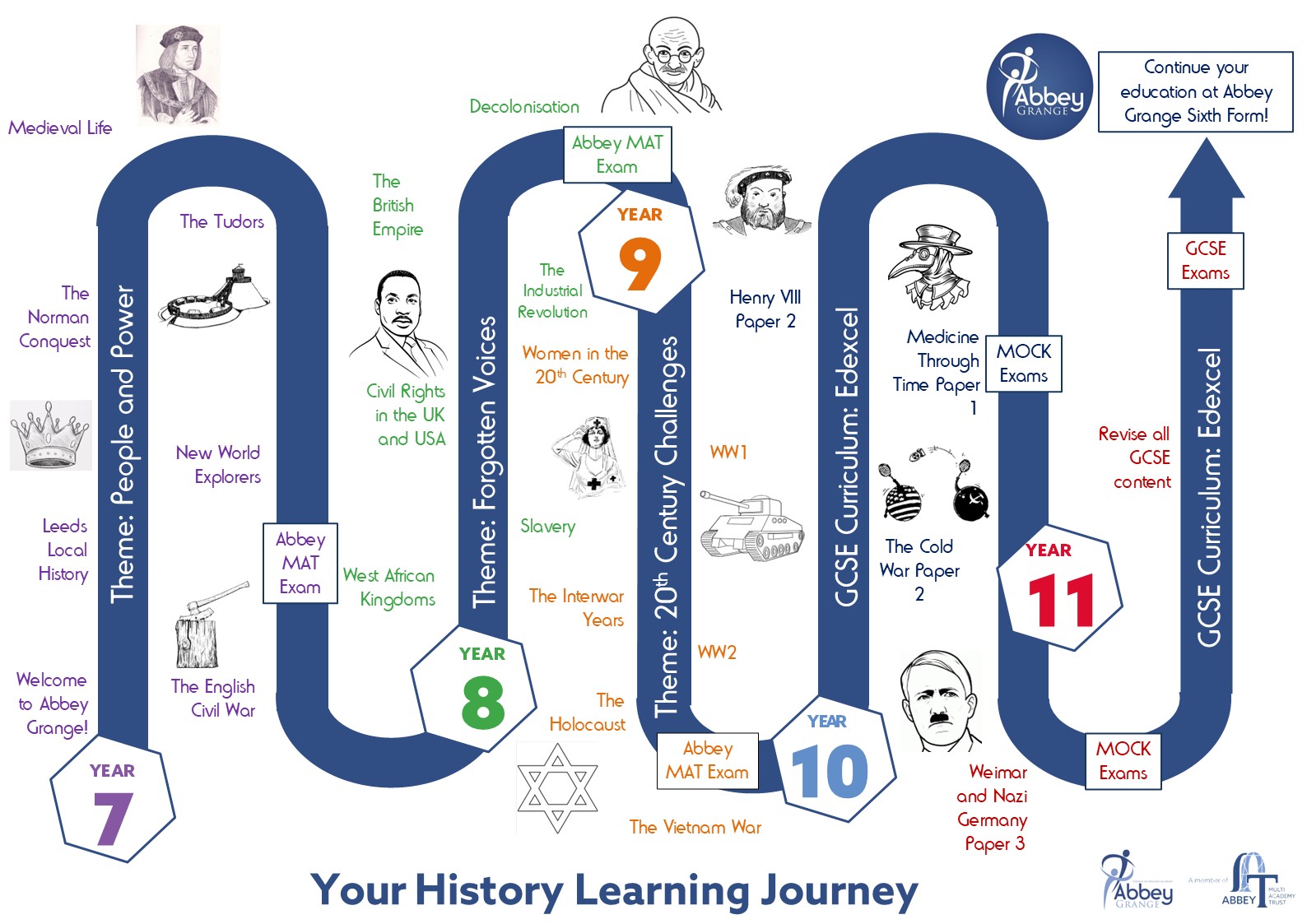
Our history curriculum is both aspirational and inclusive, offering a broad and balanced foundation that fosters a deep understanding of the past and its impact on the present. Through the exploration of key historical events from diverse perspectives, students develop the ability to interpret evidence, construct arguments and challenge viewpoints. Our curriculum nurtures curiosity, empathy and a strong sense of identity enabling students to thrive as reflective individuals who can actively engage with the world around them.

Students will uncover a diverse range of stories that shaped our city and our world. Students will begin with the local history of Leeds, explore a wide range of key historical developments in Britain covering full of ruthless rulers, deadly plots, and explosive changes in religion and power. Students will then explore different sides of world history ranging from West African Kingdoms, the people of the British Empire and the impact of the World Wars on society. Students will explore all these stories by delving into a wide range of primary sources and examining historian’s opinions. Students will be aspirational in their use of vocabulary to shape their own voices when challenging viewpoints and constructing arguments. Students will explore untold stories, challenge powerful ideas, and ask the big questions: Who holds power, who makes change, what challenges has the modern world faced and ultimately, what role will they play in the future?
By exploring how events might have unfolded differently, students can develop an understanding of how individual actions shaped the course of the key historical events such as during the Civil Rights Movement and the ending of slavery. We will consider how examples of courageous advocacy demonstrated throughout History can inspire us to shape the future we want for ourselves. Students will also take time to focus on what truly matters, learning to be comfortable with silence and reflection during lessons that consider tragedy and loss of life such as in the Holocaust and the World Wars.
Students will be assessed at specific points across each half-term. The assessments will test students’ ability to recall information, sort events into chronological order, evaluate primary sources, analyse historian’s opinions and produce pieces of historical writing.
At the end of each year, students will sit an exam in a formal setting so they can have experience of an exam setting.
Studying history at GCSE helps students understand the world today by learning how past events shaped our society. It is a fascinating subjects that builds valuable skills like critical thinking, analysis, and communication.
Students will follow the Edexcel Pearson exam board for GCSE and cover the topics of: Medicine in Britain, c1250–present and The British sector of the Western Front, 1914–18: injuries, treatment and the trenches; Superpower relations and the Cold War, 1941–91, Henry VIII and his ministers, 1509–40 and Weimar and Nazi Germany 1918-1939. These topics give students a broad overview of some key historical developments and allow them to explore some fascinating periods of History
By exploring how events might have unfolded differently, students can develop an understanding of how individual actions shaped the course of the key historical events during the Cold War, the reign of Henry VIII and Nazi Germany. Students will explore how spiritual and religious beliefs have influenced medical understanding and practice throughout British history. Through reflection and discussion, they will develop empathy for people’s experiences of illness in different eras, appreciate the resilience and hope that spiritual beliefs provided in times of suffering. Opportunities for stillness and silent reflection will help students connect with the deeper human questions that the history of medicine raises.
Students will be assessed by sitting three exams at the end of Year 11:
In addition to this, there will be various assessments across the two year course where students will have the opportunity to practice exam skills in timed conditions in preparation for their external exams.
Studying History develops students’ curiosity by investigating different time periods and their organisation as they learn how to construct logical and coherent arguments. Analytical and critical thinking are skills that are developed in History as students will question, analyse, interpret, evaluate and make judgements about different events they encounter. Students will develop transferable skills that could support careers in journalism, law or heritage as well as studying History, Politics, English or Law at A Level.

Students will follow the Edexcel Pearson exam board for A Level and cover the topics of:
Britain 1625-1701 Conflict, Revolution and Settlement, Russia in Revolution 1894-1924 and Civil Rights and Race Relations in the USA 1850-2009
Students will consider how spirituality and faith shaped key historical events and individual experiences, from the religious conflicts of Stuart Britain to the ideological suppression of faith during the Russian Revolution and the vital role of courageous advocacy in the struggle for civil rights in America. Students will reflect on the power of belief to sustain hope, inspire courageous action, and build resilient communities.
Students will be assessed by sitting three exams at the end of Year 13:
In addition to this, there will be various assessments across the two year course where students will have the opportunity to practice exam skills in timed conditions in preparation for their external exams.
Studying History develops students’ curiosity by investigating different time periods and their organisation as they learn how to construct logical and coherent arguments. Analytical and critical thinking are skills that are developed in History as students will question, analyse, interpret, evaluate and make judgements about different events they encounter. Students will develop transferable skills that could support careers in journalism, law or heritage as well as studying History, Politics, English or Law at University.